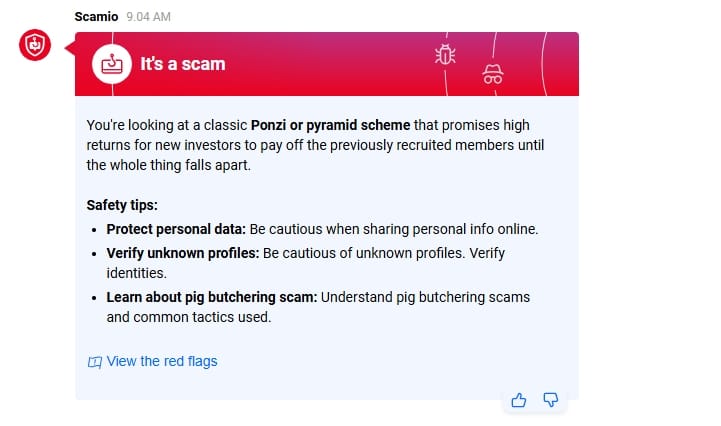BBB Warns The ‘Secret Sister’ Gift Exchange is a Holiday Scam

It’s that time of year again folks – holiday gift exchanges like Secret Santa are already being planned with friends and coworkers. Spreading the holiday cheer like this is fun, but the BBB is warning of more dubious gift exchanges happening in the digital world, where you could end up falling for a scam and even breaking the law.
In a recent warning from the BBB, the consumer protection agency says that the all-too-familiar “Secret Sister” gift exchange is bound to pop up on social media platforms again.
While it may seem harmless, it’s actually a pyramid scheme—an illegal activity in the US and Canada.
What is the 'Secret Sister' Gift Exchange?
This scheme first gained traction on Facebook several years ago, with posts promising that participants would receive up to 36 gifts in return for sending just one. Variations of the scam have evolved over time, including versions involving bottles of wine, small $10 gifts, or even e-transfers.
Participants are often lured in with heartwarming phrases like "happy mail" or "for the good of the sisterhood," seeking to make the scam look friendly and altruistic. Recently, creative spins like the “Secret Santa Dog” exchange have emerged, asking participants to buy a gift for a “secret dog.”
How the Scam Works
Users typically receive an email or see a social media post inviting them to join a holiday gift exchange. To participate, you’re asked to share your name, address, and possibly other personal details, along with contact information for a few friends or family members.
So, what’s the catch? You’re encouraged to invite more people to join by sending the same invitation to your own circle, after which you’ll be instructed to send a small gift, money, or even a bottle of alcohol to a stranger or someone higher on the list, with the promise that others will do the same for you.
The reality? The gift exchange quickly fizzles out because, like any pyramid scheme, it relies on endless recruitment to keep going. When people stop participating, the promised gifts never arrive.
Why is it dangerous?
- Pyramid schemes are illegal in the US and Canada. The US Postal Inspection Service considers them a form of gambling. Participating could lead to fines, lawsuits, or even jail time.
- Sharing your address, email, or other personal details can expose you to identity theft or future scams. Cybercriminals can use this information to steal your identity, open accounts in your name, or scam you in other ways.
- Most participants never receive the gifts or money they were promised. Instead, they end up losing time, money, and personal information.
How to Protect Yourself
1. Just ignore it! If you’re invited to join one of these exchanges, simply don’t participate. No matter how tempting it sounds, remember that it’s illegal and could put you at risk.
2. Report It. If you see a gift exchange post on social media, report it to the platform (e.g., Facebook and Instagram). You can also report it to the US Postal Inspection Service or Canadian authorities.
3. Don’t Share Personal Information. Never share your address, email, or other private details with strangers. Even seemingly harmless information can be used against you.
4. Watch for Red Flags. Be skeptical of claims that the scheme is “government-approved” or “legal.” These are lies to make the scam seem legitimate.
5. Use Bitdefender Scamio to check if social media posts inviting you to participate in secret gift exchange events could be scams.
Bitdefender Scamio is a must-have scam detection tool for netizens who want to steer clear of scams and malicious ads while browsing or interacting on their social media feeds.
Here’s what Scamio had to say about this particular type of online gift exchange:

Scamio is our FREE on-demand scam detector you can use to check for any scammy link or proposal you see online.
Scamio can analyze any texts, messages, links, QR codes, or images and give you a verdict on whether they are part of a scam. Scamio is available on Facebook Messenger, WhatsApp, your web browser and Discord.
tags
Author
Alina is a history buff passionate about cybersecurity and anything sci-fi, advocating Bitdefender technologies and solutions. She spends most of her time between her two feline friends and traveling.
View all postsRight now Top posts
How to Protect Your WhatsApp from Hackers and Scammers – 8 Key Settings and Best Practices
April 03, 2025
Outpacing Cyberthreats: Bitdefender Together with Scuderia Ferrari HP in 2025
March 12, 2025
Streamjacking Scams On YouTube Leverage CS2 Pro Player Championships to Defraud Gamers
February 20, 2025
How to Identify and Protect Yourself from Gaming Laptop Scams
February 11, 2025
FOLLOW US ON SOCIAL MEDIA
You might also like
Bookmarks







